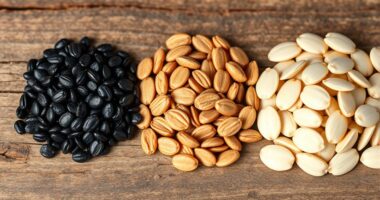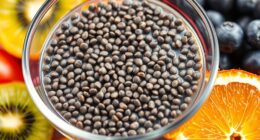Are you curious about the omega-3 benefits of chia seeds? Let’s dive into the scientific reasons behind their nutritional value.
Chia seeds are not only a fantastic source of this essential fatty acid, but they also offer a whole host of health benefits. So, if you’re looking to boost your omega-3 intake and improve your overall well-being, look no further than these tiny, mighty seeds.
Ready to learn more? Let’s get started!
Key Takeaways
- Chia seeds are a valuable source of omega-3 fatty acids, specifically alpha-linolenic acid (ALA).
- Omega-3 fatty acids are essential for heart health, brain function, and cognitive performance.
- Chia seeds can be converted into active forms of omega-3 fatty acids, EPA and DHA, which are crucial for overall health.
- Regular consumption of chia seeds can lower cholesterol levels, reduce the risk of neurodegenerative diseases, and support overall well-being.
Omega-3 Fatty Acids in Chia Seeds
Chia seeds contain a significant amount of omega-3 fatty acids, making them a valuable addition to our diet. Omega-3 fatty acids are essential fats that our bodies can’t produce on their own, so it’s crucial to obtain them from dietary sources.

Chia seeds, often hailed as a superfood, are packed with various nutrients, including these beneficial fatty acids. Omega-3 fatty acids play a vital role in supporting heart health, reducing inflammation, and promoting brain function. Consuming chia seeds can help increase our intake of these essential fats, contributing to a well-balanced and nutritious diet.
As we delve deeper into the importance of omega-3 in our diet, it becomes evident that chia seeds are a valuable and convenient source of this essential nutrient.
Importance of Omega-3 in Our Diet
As we continue exploring the nutritional benefits of chia seeds, it’s crucial to understand the significance of incorporating omega-3 fatty acids into our diet. Omega-3 fatty acids play a vital role in brain health, as they’re an essential component of cell membranes in the brain and help promote proper brain function. Research has shown that omega-3 fatty acids can improve cognitive function, memory, and mood.
For those following a vegetarian diet, it may be challenging to obtain sufficient omega-3 fatty acids, as they’re primarily found in fatty fish. However, there are vegetarian sources of omega-3 fatty acids, such as chia seeds, flaxseeds, and walnuts. These plant-based sources provide alpha-linolenic acid (ALA), which can be converted by the body into the active forms of omega-3 fatty acids.

With this understanding, let’s now delve into why chia seeds are an excellent plant-based source of omega-3.
Chia Seeds: A Plant-Based Omega-3 Source
Continuing our exploration of the nutritional benefits of chia seeds, let’s now delve into their role as an excellent plant-based source of omega-3 fatty acids. As we mentioned earlier, omega-3 fatty acids are essential for our overall health and well-being. While many people rely on fish as their primary source of omega-3s, chia seeds offer a valuable alternative for those following a plant-based diet.
Chia seeds are packed with alpha-linolenic acid (ALA), a type of omega-3 fatty acid. Just one ounce of chia seeds provides a whopping 4,915 mg of ALA, according to the USDA National Nutrient Database. To put things into perspective, the recommended daily intake of ALA for adult males is 1,600 mg, while for adult females, it is 1,100 mg. This means that incorporating chia seeds into your diet can easily help you meet your omega-3 needs.
Here’s a breakdown of the omega-3 content in chia seeds compared to other plant-based sources:
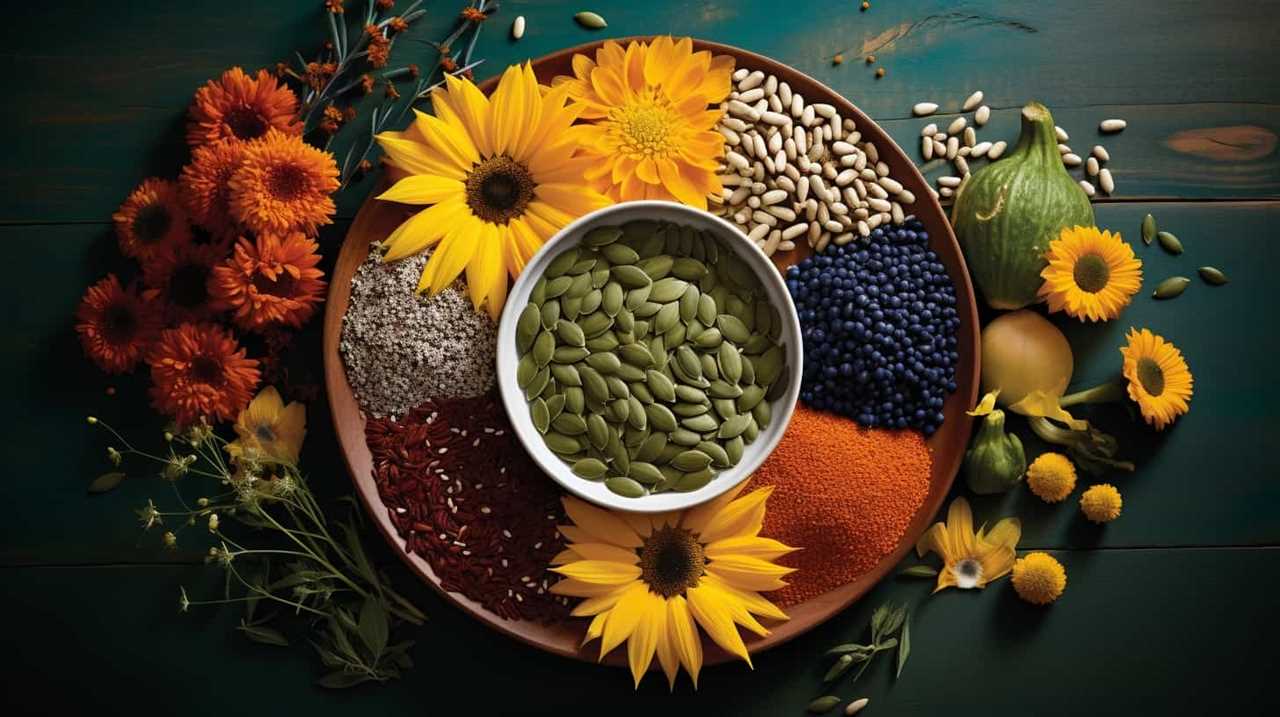
| Food | Omega-3 Content (per 1 ounce) |
|---|---|
| Chia Seeds | 4,915 mg |
| Flaxseeds | 6,388 mg |
| Hemp Seeds | 6,000 mg |
| Walnuts | 2,570 mg |
| Brussels Sprouts | 135 mg |
As you can see, chia seeds are an excellent choice for those looking to boost their omega-3 intake through plant-based nutrition. They offer a substantial amount of ALA, comparable to other popular sources like flaxseeds and hemp seeds. So, whether you’re vegan, vegetarian, or simply looking for alternative omega-3 sources, incorporating chia seeds into your diet can provide you with the essential fatty acids your body needs.
How Chia Seeds Boost Omega-3 Intake
To further enhance our omega-3 intake, let’s delve into how chia seeds contribute to boosting these essential fatty acids.
Chia seeds are a remarkable source of omega-3 fatty acids, particularly alpha-linolenic acid (ALA). When consumed, these tiny seeds provide our bodies with a high concentration of ALA, which is then converted to eicosapentaenoic acid (EPA) and docosahexaenoic acid (DHA). Both EPA and DHA are crucial for maintaining optimal brain function and supporting overall health.
Studies have shown that consuming chia seeds regularly can help improve cognitive performance and reduce the risk of neurodegenerative diseases. Additionally, chia seeds have been found to lower cholesterol levels, reducing the risk of heart disease.
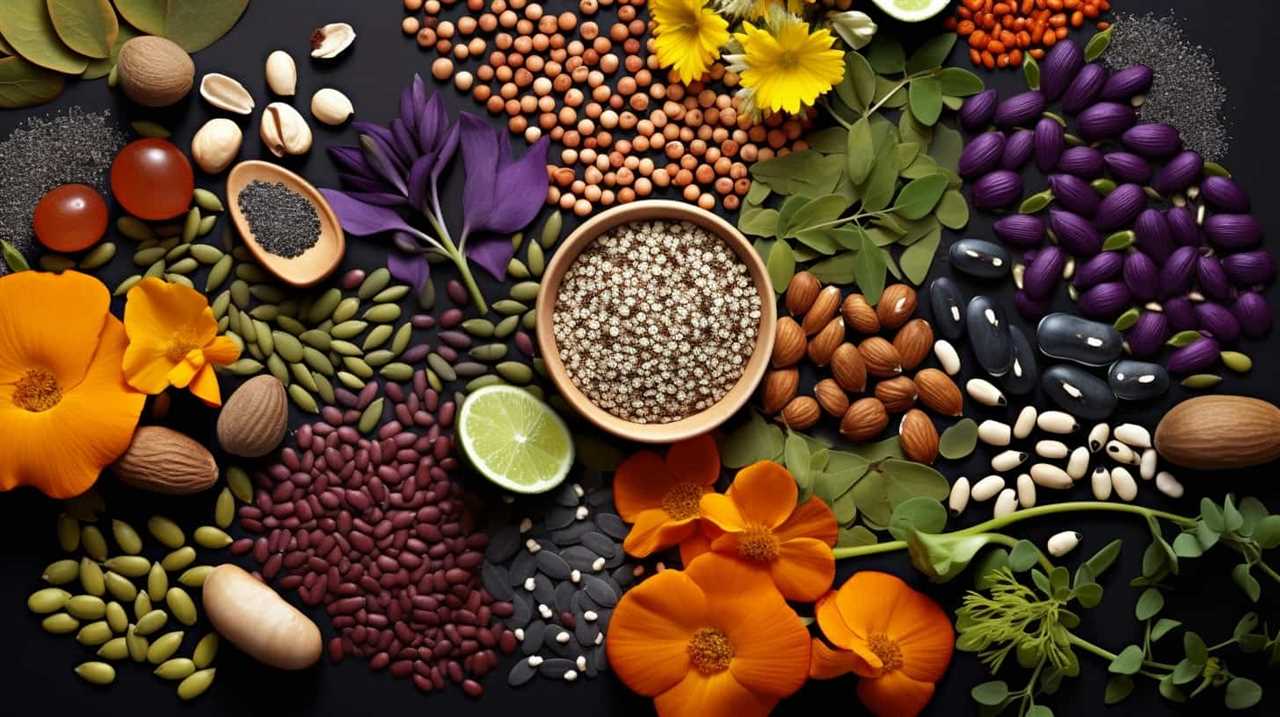
Incorporating chia seeds into our diet is a simple and effective way to boost our omega-3 intake and support our overall well-being.
Omega-3 Benefits for Overall Health
For our overall health, omega-3 provides numerous benefits.
Omega-3 fatty acids, found in foods like chia seeds, have been shown to play a crucial role in brain health. Research suggests that omega-3s can improve cognitive function, enhance memory, and reduce the risk of neurodegenerative diseases such as Alzheimer’s and dementia.
These essential fatty acids are also beneficial for heart health. Studies have demonstrated that omega-3s can lower blood pressure, reduce triglyceride levels, and decrease the risk of heart disease and stroke.

Furthermore, omega-3s have anti-inflammatory properties, which can help alleviate symptoms of chronic inflammation and autoimmune disorders.
Incorporating omega-3-rich foods like chia seeds into our diet can therefore have a significant positive impact on our overall health, particularly brain and heart health.
Frequently Asked Questions
How Many Grams of Omega-3 Fatty Acids Are Found in One Serving of Chia Seeds?
In one serving of chia seeds, the omega-3 content provides numerous health benefits. With a high concentration of omega-3 fatty acids, chia seeds support heart health, reduce inflammation, and improve brain function.
Can Chia Seeds Be a Suitable Source of Omega-3 for Vegetarians and Vegans?
Chia seeds are a suitable source of omega-3 for vegetarians and vegans. They have a higher omega-3 content compared to other plant-based sources, making them an ideal option for omega-3 supplementation.
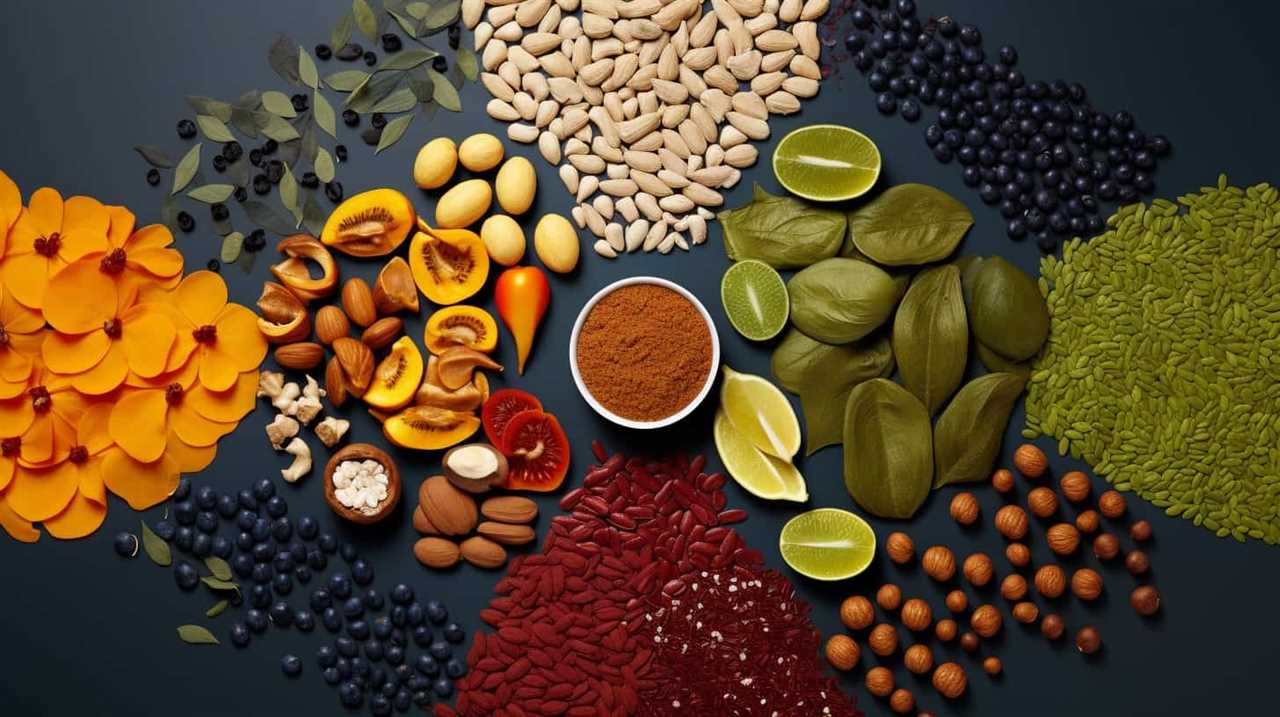
Are Chia Seeds a Good Alternative for Those Who Are Allergic to Fish and Seafood?
Chia seeds are a great alternative for those allergic to fish and seafood. They provide protein for vegetarians and act as a natural energy booster. Plus, they’re rich in omega-3 fatty acids!
Is There a Recommended Daily Intake of Omega-3 From Chia Seeds?
There isn’t a recommended daily intake of omega-3 from chia seeds, but incorporating them into our diet can provide numerous health benefits. They’re a great plant-based source of this essential fatty acid.
Are There Any Potential Side Effects or Risks Associated With Consuming Chia Seeds for Their Omega-3 Content?
There may be potential risks and side effects associated with consuming chia seeds for their omega-3 content. It is important to be aware of these and consult with a healthcare professional before incorporating them into your diet.
Conclusion
In conclusion, chia seeds are an excellent plant-based source of omega-3 fatty acids. These essential nutrients play a crucial role in maintaining overall health and well-being.

With their high omega-3 content, chia seeds offer a convenient and accessible way to boost our intake of these beneficial fatty acids. Whether it’s supporting heart health, reducing inflammation, or improving brain function, incorporating chia seeds into our diet can have a significant impact on our overall health.
So why not start adding these tiny seeds to your meals and reap the numerous benefits they offer?


